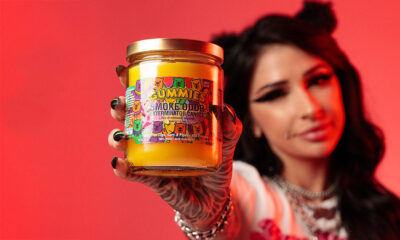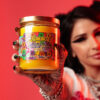
In History
Get Buzzed: The Science Behind Cannabis & Coffee
Though drinking coffee is comparatively new, caffeine is the most commonly used drug worldwide, and coffee is its main delivery method.
Cannabis has been used by humanity for over 6,000 years, since the earliest dawn of civilization. Coffee was discovered in Ethiopia in the 15th century and spread throughout Yemen and the Arabian Peninsula by the century’s end, and within another hundred years it was drank widely across the Middle East. In the U.S., 83 percent of adults drink coffee regularly, whereas adult past-month cannabis use is only 16 percent (still enough to make it the most commonly used illegal drug). Despite coffee and cannabis being two of the most commonly-used drugs in the world, their combined effects are poorly understood, at least until recent research began to illuminate the many interactions between two of humanities favorite mind-altering substances.
While cannabis has countless interactions in the brain and the rest of the body, due to the omnipresent endocannabinoid system, caffeine only has known action within the brain, blocking the receptor site for adenosine. A 2015 study funded by the National Institutes of Health found that consuming low doses of caffeine should lower THC cravings and higher doses of caffeine would increase cravings for THC. This appears to be because coffee triggers activity at the endocannabinoid CB1 receptor site, the same one that THC interacts with to cause psychoactivity and create feelings of euphoria. If you ever wondered why people seem to perk up and get happier when they drink coffee, this is why; the Starbucks version of wake and bake.
A 2012 study in the British Journal of Pharmacology sought to examine the effects of caffeine and THC on memory. The study’s authors noted that THC “induces deficits in short-term memory,” but caffeine is known to selectively improve memory function, though it appears that it actually makes memory deficits worse when combined with THC. Perhaps dabbing and shots of espresso aren’t the best way to prep for school exams, or maybe you are a believer in state-dependent memory and you study high, take the tests high, and score high.
There are several brands of cannabis-infused coffee on the market, some are brew-it-yourself and others are pre-brewed. Most are THC based, though some CBD-rich options are out there. The first cannabis infused coffee I ever encountered was THCafe‘s coffee at Harborside four years ago, which has 40mg of THC and is pre-brewed. In the past couple of years, several competitors have entered the market and some are even hiring pharmacists to help brew the perfect cup of canna-coffee.
Three new brands entered the market in 2015 – Chocowaska, Jane’s Brew and Pot-O-Coffee. Chocowaska has various flavors of medicated drinks all based off hemp milk, and their “Mocha” variety has 43mg of caffeine from organic espresso concentrate, which also packs 150mg of THC (nearly four times the amount in THCafe). Chocowaska is the only brand that currently uses organic coffee (though it is from a concentrate). Jane’s Brew has medicated coffees and teas, in both THC and CBD-rich options, and varying potencies ranging up to 200mg for THC and 20mg of CBD. Jane’s Brew features both pre-brewed and brew-it-yourself options.
Pot-O-Coffee, like Jane’s Brew, has both THC and CBD-rich options (up to 100mg for THC and 10mg for CBD). Pot-O-Coffee does not have any pre-brewed coffees, so you will need to brew the coffee from either Keurig cups or coffee pods, and the pods can be used in any normal coffee maker (Jane’s Brew offers the same two options but their pods are french press friendly). When I sampled a 50mg THC-rich Pot-O-Coffee Keurig cup I opened it up and mixed the grinds into some non-medicated coffee and ran it in my french press, which worked fine. I found the flavor to be overall quite pleasant, nutty and rich, even though it was not organic. Drinking a medicated cup of coffee over the course of a morning is a nice way to micro-dose THC to create a more gradual edibles high, rather than taking the same amount of THC all in one dose and getting hit with it all at once an hour or so later.
When I interviewed Cass Riese, the head of marketing and business development for Pot-O-Coffee, he made it clear they are taking the science behind their product seriously and have “hired two pharmaceutical chemists” to work on an even better process to infuse their coffee with a CO2 oil. The oil they use is from hybrid cannabis strains and the coffee is from arabica beans, using an Italian roast. Pot-O-Coffee even has decaf and hazelnut options on the way.
So what does the science tell us about the potential effects of THC-infused coffee? Since both caffeine and THC trigger the CB1 receptor, users can expect a greater euphoric feeling and likely increased psychoactivity. Both THC and caffeine may impact memory functioning, so it might not be the best idea to drink a pot of canna-coffee before anything that needs to be remembered (depending on where you work, not remembering how bad your day went could be a benefit). Joking aside, THC’s ability to help users forget traumatic events is a major component of how cannabis combats post traumatic stress disorder by interacting with the endocannabinoid system.
On top of the numerous benefits of THC and other cannabinoids, coffee also displays numerous medical benefits for various cancers, in reducing rates of depression in women and lowering suicide rates in men. The medical benefits of coffee combine with the benefits of cannabis in an entourage effect which raises the effectiveness of both plants, and includes more than just terpenes and cannabinoids to create a medical effect. The idea of using dietary components in addition to cannabis treatments to raise the overall efficacy of the treatment could be a new frontier in holistic herbal medicine.
Do you enjoy cannabis and coffee?


























